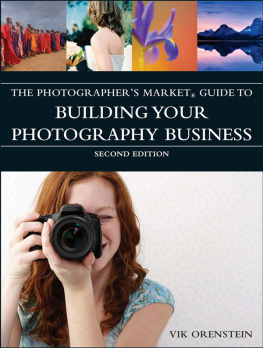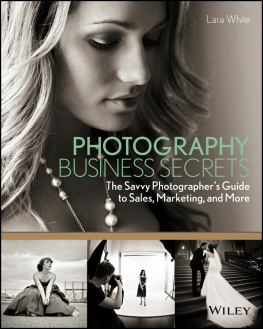Copyright 2010 by Damon Tucci and Rosena Usmani.
All photos by Damon Tucci unless otherwise noted.
All rights reserved.
Printed in Korea.
10 9 8 7 6 5 4 3 2 1
No part of this publication may be reproduced, stored, or transmitted in any form or by any means, electronic, mechanical, photocopied, recorded or otherwise, without prior written consent from the publisher.
Notice of Disclaimer: The information contained in this book is based on the authors experience and opinions. The author and publisher will not be held liable for the use or misuse of the information in this book.
CONTENTS




INTRODUCTION
A BUSINESS PHILOSOPHY
I was trained at Walt Disney World, and while I was employed there, my core business values were instilled in me. Essentially, everything is based on the Golden Rule, which dictates that we should treat people the way that we would like to be treated. Keep this in mind every time you deal with your clients, and youll reap the rewards of happier clients and repeat business. Keep this in mind as you read through the book and as you start work every day.
S o youve decided to be a photographer. You studied photography in college or went to art school, and youve come to the point of deciding that its time to hang out your shingle. Or maybe youre self-taught and everyone loves your work and says, Hey, you could make a living at this! Either way, youve decided to make a go at being a true professional photographer. Good for you! Its an exciting field, and nothing is more rewarding than being your own boss.
Be advised, though: like anything in life, being an entrepreneur has its pros and cons. It takes a certain personality to pull this off. Many of us are naturally leaders or followers, and the sheep will not stay in business long. Year after year, photography businesses open and close. It is easy to be vanquished by the many pitfalls that youll encounter. This book is a road map that will help you to navigate past the perils youll encounter on your road to success.


By now, youve honed your photography skills and developed an amazing style. If you want to succeed in this business, you must now master another artone they didnt teach you in school: the art of business.
I personally started my career working for Walt Disney World. I was employed there for ten years and was able to concentrate my efforts on my photography. When I opened my own place in 2000, I had to put my photography on hold and embrace Business 101. I had to turn my attention toward accounting, marketing, business plans, and bottom lines. I made several errors along the way. The purpose of this book is to help prevent you from making some of the same mistakes.
1. BUILDING A FOUNDATION
ONE OF THE FIRST STEPS YOULL NEED TO TAKE WHEN STARTING UP YOUR BUSINESS IS TO OBTAIN A LICENSE.
A ll too often, photographers start out working under the table. This may work for a while, but it is short sighted and can be costly in the end. At some point, youll want to spread your entrepreneurial wings and open your own business. Of course, youll want to follow some basic guidelines and rules.
DO IT BY THE BOOK
Getting a License. One of the first steps youll need to take when starting up your business is to obtain a license.
The licensing requirements vary from one region to the next, and your best bet to determining what youll need to do before conducting business in your neck of the woods is to visit www.occupationallicense.com. Youll find information about incorporating your business on this site as well.
We live in downtown Orlando, Florida. In downtown Orlando, the first thing you need to do is to obtain occupational licenses. If you are within city limits, as we are, you will need both city and county licenses. These are easily obtained. The city license runs about $137 a year, and the county one is around $37. Occupational licenses are relatively easy to obtain and must be renewed annually.



CHARTING THE COURSE
It is best to have realistic expectations when you are going into business. Most businesses of any kind generally do not make money in the first three years.
WHATS IT WORTH?
As artists, we sometimes feel weird about putting a price tag on what we do. To continue this journey, though, you must overcome this. Getting a handle on the financial overview of your business will help you ensure your prices help you to reach all of your profit goals.
Getting a Sales Tax ID. The next step is to obtain a sales tax ID. In Florida, tax IDs are regulated by the Florida Department of Revenue. The sales tax ID is also relatively easy to obtain; however, one must educate oneself on the proper way to fill out the forms. You will be required to pay your sales tax monthly or quarterly. Be advised that once you are in the system, you must file your taxes by the appropriate due dates. Penalties for failure to do so are severe and add up quickly. There is not much leniency for ignorance of the system.
The department offers classes on how to fill out the paperwork. It is not rocket science, but if you have never done it before, it can be a little daunting. If you live in Florida, you can go to www.myflorida.com/dor, log everything you made, and pay your taxes online.
HIRE AN ACCOUNTANT
Once youve obtained the necessary licensing and have gotten a tax ID, youll want to find a good accountant. A good accountant is a partner for your business. They can help you set up an ideal infrastructure to build upon.



















